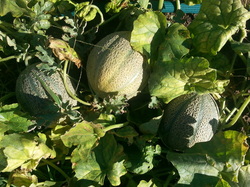
I had a surprise crop of cantaloupe growing in my back yard this summer that came up from seeds from the cantaloupe I grew last summer. I sliced open the light-tan fruit that was fully ripened on the vine and revealed the beautiful, soft, sweet, light orange-colored flesh on the inside. Yum! Cantaloupe is one of my absolute favorite fruits! In addition to being delicious, fresh cantaloupe has several health benefits!
Vitamin A. The orange color serves as a clue that like carrots and sweet potatoes, cantaloupe is a great source of vitamin A, which is delivered in the form of beta-carotene. Our body converts beta-carotene into vitamin A, which is key for good vision, a healthy immune system, and cell growth. One cup of cubed cantaloupe has 5,411 IU of vitamin A, nearly half the vitamin A found in a large carrot.
Vitamin C. Cantaloupe is a good source of vitamin C, with 58.7 mg of vitamin C in 1 cup of cubed cantaloupe, roughly the same amount as in a medium orange (59.1 mg). Vitamin C has antioxidant properties that protect the body against free radicals. Vitamin C also boosts our immune system and stimulates white blood cells, which kill viruses and bacteria.
Potassium. Cantaloupe is rich in potassium, with 427 mg of potassium in 1 cup of cubed cantaloupe, roughly the same amount as in a medium banana (422 mg). Potassium normalizes the heartbeat and promotes oxygen to the brain, helping you feel more relaxed and focused.
Antioxidant and anti-inflammatory nutrients. Cantaloupe provides a wide range of antioxidants in addition to vitamin C, including polyphenols, that help prevent oxidative stress as well as a wide range of anti-inflammatory phytonutrients that help prevent excessive inflammation. Some research has shown that cantaloupes that have ripened almost to the point of spoiling have increased levels of antioxidants.
Adenosine. Cantaloupes are rich in adenosine, a compound that thins blood, preventing blood clots, and decreases blood pressure. Adenosine and folate (34 ug in 1 cup cubed) in cantaloupes help prevent heart attacks.
High in fiber and low in fat and calories. The fiber fills you up, helps you absorb nutrients in the cantaloupe, and keeps things moving through your intestinal tract. The combination of high fiber and low fat and calories makes cantaloupe a great food for optimal health and weight.
Cantaloupe is great on its own, in smoothies, frozen into bite-size treats, over cereals, and mixed with other fresh fruits. When was the last time you had cantaloupe?
Resources
UDSA National Nutrient Database
http://www.ncbi.nlm.nih.gov/pubmed/11065230
http://www.whfoods.com/genpage.php?tname=foodspice&dbid=17
http://www.3fatchicks.com/5-health-benefits-of-cantaloupe/
http://www.myhealthyfoods.com/fruits/health-benefits-of-cantaloupe/
Vitamin A. The orange color serves as a clue that like carrots and sweet potatoes, cantaloupe is a great source of vitamin A, which is delivered in the form of beta-carotene. Our body converts beta-carotene into vitamin A, which is key for good vision, a healthy immune system, and cell growth. One cup of cubed cantaloupe has 5,411 IU of vitamin A, nearly half the vitamin A found in a large carrot.
Vitamin C. Cantaloupe is a good source of vitamin C, with 58.7 mg of vitamin C in 1 cup of cubed cantaloupe, roughly the same amount as in a medium orange (59.1 mg). Vitamin C has antioxidant properties that protect the body against free radicals. Vitamin C also boosts our immune system and stimulates white blood cells, which kill viruses and bacteria.
Potassium. Cantaloupe is rich in potassium, with 427 mg of potassium in 1 cup of cubed cantaloupe, roughly the same amount as in a medium banana (422 mg). Potassium normalizes the heartbeat and promotes oxygen to the brain, helping you feel more relaxed and focused.
Antioxidant and anti-inflammatory nutrients. Cantaloupe provides a wide range of antioxidants in addition to vitamin C, including polyphenols, that help prevent oxidative stress as well as a wide range of anti-inflammatory phytonutrients that help prevent excessive inflammation. Some research has shown that cantaloupes that have ripened almost to the point of spoiling have increased levels of antioxidants.
Adenosine. Cantaloupes are rich in adenosine, a compound that thins blood, preventing blood clots, and decreases blood pressure. Adenosine and folate (34 ug in 1 cup cubed) in cantaloupes help prevent heart attacks.
High in fiber and low in fat and calories. The fiber fills you up, helps you absorb nutrients in the cantaloupe, and keeps things moving through your intestinal tract. The combination of high fiber and low fat and calories makes cantaloupe a great food for optimal health and weight.
Cantaloupe is great on its own, in smoothies, frozen into bite-size treats, over cereals, and mixed with other fresh fruits. When was the last time you had cantaloupe?
Resources
UDSA National Nutrient Database
http://www.ncbi.nlm.nih.gov/pubmed/11065230
http://www.whfoods.com/genpage.php?tname=foodspice&dbid=17
http://www.3fatchicks.com/5-health-benefits-of-cantaloupe/
http://www.myhealthyfoods.com/fruits/health-benefits-of-cantaloupe/



 RSS Feed
RSS Feed